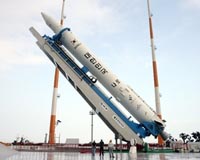 |
Seoul (AFP) Aug 26, 2009 A satellite launched atop South Korea's first space rocket is thought to have burnt up in the earth's atmosphere after missing its designated orbit, officials said Wednesday. Seoul vowed to press on with its drive to become a space technology leader despite Tuesday's setback, caused by the defective operation of a fairing covering the satellite. The science and technology ministry said one of the two aerodynamic fairings covering the rocket's tip failed to fall away after opening in preparation for the satellite's release. Because of the fairing's weight the second stage of the rocket could not achieve enough thrust to place the satellite in orbit. Its speed fell to 6.2 km per second instead of an optimum eight km. Deputy science minister Kim Jung-Hyun said the extra weight also caused the rocket to steer upwards and the satellite to be released at an altitude of 387 km (242 miles), far higher than the planned 302 km. South Korea had invested more than 500 billion won (400 million dollars) and much national pride in the satellite and the 33-metre (108-foot) rocket. The first stage was built in collaboration with Russia's Khrunichev space centre. The second stage, including the defective fairings, was constructed by local engineers who also built the 100-kilogram (220-pound) research satellite. "South Korea was in charge of the separation of fairings while Russia was in charge of overall technical assistance. Therefore the two countries share the responsibility," Kim told reporters. "Further discussions (with Russia) will be held on this point." The launch had been delayed seven times since 2005, most notably last week when the countdown was stopped eight minutes before blastoff. "We can say it was half successful, though the satellite failed to enter orbit," President Lee Myung-Bak told a cabinet meeting Tuesday evening. "We must realise our dream of becoming a leading country in space technology, even if it takes an eighth attempt after seven failures or a ninth attempt after eight failures." Korea Aerospace Research Institute expert Chae Yeon-Seok was more upbeat. "Despite the glitch, this was a success as all main systems including the two brand-new first and second-stage rockets operated normally," Chae told AFP. North Korea, smarting at the UN Security Council's censure of its own April 5 rocket launch, had vowed to closely monitor reaction to its neighbour's launch from Goheung on the south coast. Washington and its allies said the launch by the nuclear-armed North was a disguised test of a long-range missile. South Korea limits its own missiles to a 300 km range under an accord with its ally the United States. US State Department spokesman Ian Kelly said Tuesday the South's space programme had been developed "in a responsible manner". The nation has previously sent 10 satellites into space using launch vehicles from other countries. In November 2007 it announced an ambitious plan to launch a lunar orbiter by 2020 and to send a probe to the Moon five years after that. South Korea unveiled the lunar project one month after China launched its first lunar orbiter and two months after Japan did the same. In April last year Seoul sent its first astronaut into space aboard a Russian Soyuz rocket. Share This Article With Planet Earth
Related Links Rocket Science News at Space-Travel.Com
 SKorea bids again for first rocket launch
SKorea bids again for first rocket launchSeoul (AFP) Aug 25, 2009 South Korea was preparing to launch its first space rocket later Tuesday, six days after a software glitch halted the countdown just eight minutes before blast-off. The project to put a South Korean satellite into orbit, operated in partnership with Russia, has been delayed seven times in recent years. "We've fixed the computer software problem and overhauled all other software. We hope ... read more |
|
| The content herein, unless otherwise known to be public domain, are Copyright 1995-2009 - SpaceDaily. AFP and UPI Wire Stories are copyright Agence France-Presse and United Press International. ESA Portal Reports are copyright European Space Agency. All NASA sourced material is public domain. Additional copyrights may apply in whole or part to other bona fide parties. Advertising does not imply endorsement,agreement or approval of any opinions, statements or information provided by SpaceDaily on any Web page published or hosted by SpaceDaily. Privacy Statement |